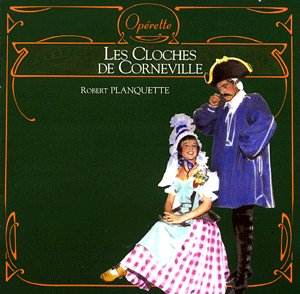This attractively boxed CD set is taken from
a 2LP set issued in the 1960s at a time when Decca in France were
building a large catalogue of operetta. The set competes well
with the other available set from EMI.
Robert Planquette was a Parisian of Norman
origin, the son of a singer and attended the Paris Conservatoire.
He was a poor student and preferred to exploit his talents as
a café accompanist and singer.
In 1876, Planquette was given a commission to
compose an operetta and Les Cloches de Corneville was the
result. It followed lukewarm receptions of Offenbach's La Foire
Saint-Laurent and Chabrier's L'Étoile. When
premièred on 17 April 1877 the piece ran for 580 performances.
When translated into English and performed in London it upstaged
HMS Pinafore by chalking up a staggering 708 performances.
In the first run, a very young Juliette Girard as Serpolette went
under the name of Simone Girard to later become a well-known singer.
Les Cloches de Corneville, was
Planquette's first full operetta score, and followed the writing
of individual songs. With little background experience in composing
for the stage, it is amazing how this first operetta flows with
such melody, strong rhythm and interesting orchestral colour.
The chorus parts are written with energy and
the work sparkles with lively motifs. Planquette’s skill in getting
melodies to blend and flow can be heard in the Act 1 finale (CD1
tk.11) where catchy rhythms and vibrant colour hold the listener's
attention.
Les Cloches de Corneville survived until
the 1940s in Britain and was probably the most popular French
operetta of all time. The storyline is similar to that of ‘La
Dame blanche’ and ‘Martha’
The plot surrounds a supposedly haunted castle
with an heir who returns incognito. An abandoned girl who thinks
she is a princess meets a fake ghost who is in fact an old miser
trying to profit from the riches of his elderly employer. When
to this one adds a flavour of Gaelic tradition as well as tuneful,
well-crafted music one is assured of a success.
I always think Planquette's music should be taken
at a reasonable pace: here conductor Pierre Dervaux does just
that. The overture contains accelerandos that although not in
the score are effective, but at times Dervaux takes passages so
fast that the players do well to keep up with him.
The soloists are excellent: Huguette Boulangeot
is powerful and is likely to have considerable charisma on stage.
She is well matched by Ernest Blanc as the Marquis who is sensitive
to the Viennese waltz idiom. But I found him too forwardly miked
in the hit song 'J'ai fait trois', however, and this masked
the orchestra to some extent. Of the other singers, Jean Giraudeau
is a light tenor who provides marked clarity of voice and provides
good dynamics. His elegant arched phrases and ability to hold
long top notes with ease made listening to him a joy. Colette
Riedinger is a confident soprano who again has crystal clear diction.
This is a good recording with all sections of
the orchestra nicely separated in the overture and under Dervaux's
direction a sprightly and energetic performance is provided. A
need to squeeze the score onto four LP sides has inevitably required
some material to be edited out: but all the important songs are
here.
There is a reasonable balance between singers
and orchestra, but I found the recording engineer habitually starts
choir tracks with distant miking to give an effect that the villagers
are approaching. Although nice when heard once, this becomes repetitious,
however.
Short notes on Planquette and the plot are provided,
written in French.
Raymond Walker
Operette
series from Universal Accord reviewed
by Ray Walker
